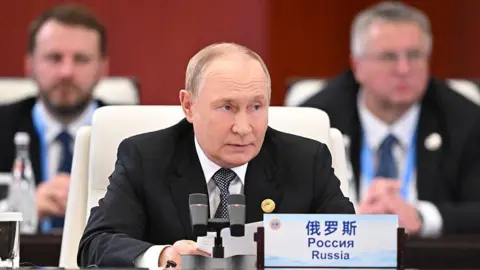Russian President Vladimir Putin claims to have reached 'understandings' with US President Donald Trump regarding the resolution of the Ukraine conflict during their meeting in Alaska last month.
While Putin acknowledged these discussions, he did not confirm whether he would engage in peace negotiations with Ukrainian President Volodymyr Zelensky, which Trump reportedly set a deadline for.
During a summit in China, Putin defended his actions in Ukraine, consistently attributing the conflict to Western intervention.
Following the Alaska meeting, US special envoy Steve Witkoff suggested that Putin might agree to certain security assurances for Ukraine, but Russian confirmation is yet to be seen.
Putin made these comments at the Shanghai Cooperation Organisation summit, where he appreciated the support from leaders such as Xi Jinping and Narendra Modi in attempts to navigate the Ukrainian crisis.
Both China and India continue to be major importers of Russian oil, leading to criticisms from the West regarding their economic backing of Russia amidst the conflict.
Putin expressed hope that the 'understandings' with Trump would pave the way for peace in Ukraine, reiterating his stance that the crisis was provoked by Western influences and Ukraine's potential NATO membership.
The Russian president has continuously objected to Ukraine joining NATO, a stance established since the Crimea annexation in 2014 and the full-scale invasion in 2022.
Putin's statements come in the wake of intensified Russian military operations in Ukraine, with reports of significant aerial assaults resulting in civilian casualties.
French President Emmanuel Macron stated that Trump issued a deadline for Putin to respond regarding the peace talks; failing to do so would reportedly indicate a lack of sincerity from the Russian leader.
Interestingly, Trump had indicated earlier that he believed a resolution could be achieved quickly, shifting the focus away from ceasefire demands to a more lasting peace agreement.
Despite ongoing hostilities, both sides appear to recognize the necessity for dialogue, with evolving expectations for security guarantees being discussed at the international level.






















